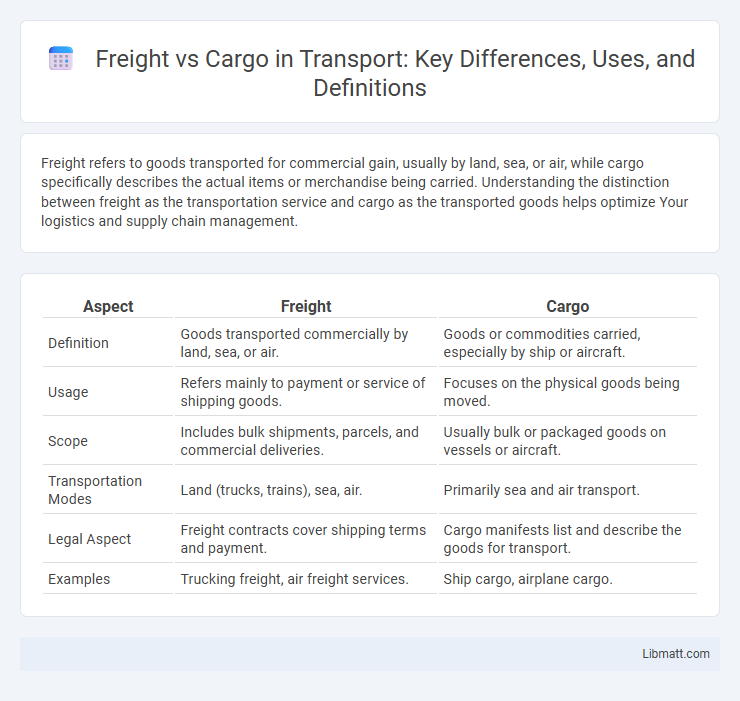Freight refers to goods transported for commercial gain, usually by land, sea, or air, while cargo specifically describes the actual items or merchandise being carried. Understanding the distinction between freight as the transportation service and cargo as the transported goods helps optimize Your logistics and supply chain management.
Table of Comparison
| Aspect | Freight | Cargo |
|---|---|---|
| Definition | Goods transported commercially by land, sea, or air. | Goods or commodities carried, especially by ship or aircraft. |
| Usage | Refers mainly to payment or service of shipping goods. | Focuses on the physical goods being moved. |
| Scope | Includes bulk shipments, parcels, and commercial deliveries. | Usually bulk or packaged goods on vessels or aircraft. |
| Transportation Modes | Land (trucks, trains), sea, air. | Primarily sea and air transport. |
| Legal Aspect | Freight contracts cover shipping terms and payment. | Cargo manifests list and describe the goods for transport. |
| Examples | Trucking freight, air freight services. | Ship cargo, airplane cargo. |
Understanding the Basics: What is Freight vs Cargo?
Freight refers to goods or commodities transported in bulk by land, sea, or air, typically emphasizing the commercial aspect of shipping. Cargo specifically denotes the items or merchandise carried on a vessel, aircraft, or vehicle, highlighting the physical load being moved. Understanding these terms is essential for logistics, supply chain management, and international trade operations.
Key Differences Between Freight and Cargo
Freight typically refers to goods transported in bulk by commercial carriers such as trucks, ships, or planes, emphasizing the shipment process and logistics. Cargo denotes the actual items or merchandise being shipped, covering all transported goods regardless of the mode or container type. Key differences include freight's focus on the transportation method and cost aspects, while cargo centers on the content and classification of the goods moved.
Origin and Etymology of Freight and Cargo
Freight originates from the Old English word "freoht," meaning goods transported for payment, emphasizing the commercial aspect of moving items. Cargo derives from the Spanish "cargar," meaning to load or burden, highlighting the act of loading goods onto a vessel. Understanding the etymology of freight and cargo helps clarify their distinct connotations in shipping and logistics.
Types of Goods: Freight vs Cargo Applications
Freight typically refers to goods transported commercially by land, sea, or air, including bulk items like machinery, raw materials, and manufactured products. Cargo broadly encompasses any goods or commodities carried on a vehicle, including personal belongings, packages, and mail in addition to commercial shipments. Freight often involves large-scale, organized logistics operations for industrial goods, whereas cargo includes a wider range of transported items in diverse contexts such as shipping, aviation, and rail transport.
Modes of Transportation for Freight and Cargo
Freight and cargo are transported through various modes including air, sea, rail, and road, each offering distinct advantages based on speed, cost, and volume. Air freight is ideal for urgent, high-value goods, while sea cargo accommodates large volumes at lower costs, making it suitable for bulk shipments. Understanding these transportation options helps you optimize delivery efficiency and manage logistics effectively.
Industry Usage: Freight and Cargo in Logistics
Freight and cargo are essential terms in the logistics industry, often used interchangeably but with distinct applications; freight refers primarily to goods transported for commercial gain, usually via land or sea, while cargo encompasses all types of goods carried by any transport mode, including air and rail. Industry professionals use freight to describe bulk shipments and contractual transport services, whereas cargo highlights the physical items being moved regardless of the shipping method. Understanding the distinction optimizes your logistics strategy by ensuring precise communication and efficient handling of shipments across global supply chains.
Pricing Structures for Freight vs Cargo
Freight pricing structures typically depend on weight, volume, distance, and transportation mode, often utilizing tariffs or contractual rates for bulk shipments. Cargo pricing, meanwhile, emphasizes value, urgency, and handling requirements, commonly applying per-unit or declared-value charges for goods transported. Understanding these differences helps businesses optimize shipping costs by selecting the appropriate pricing model based on shipment characteristics.
Legal and Insurance Aspects
Freight refers to the transportation of goods for commercial purposes, governed by specific contracts that define liability and responsibilities between carriers and shippers, while cargo is the actual goods being transported. Legal frameworks such as the Carriage of Goods by Sea Act (COGSA) and the Warsaw Convention regulate freight contracts, imposing limitations on liability and claims processes. Insurance for freight covers risks related to loss, damage, or delay during transit, often requiring shippers to secure cargo insurance policies tailored to the nature of the goods and modes of transport.
Common Misconceptions About Freight and Cargo
Freight and cargo are often used interchangeably, but freight specifically refers to goods transported for commercial gain, while cargo encompasses all goods carried by a vehicle, including personal items. A common misconception is that freight always involves large shipments, whereas cargo can be any size or type of goods in transit. Understanding these distinctions clarifies logistics processes and improves communication in transportation industries.
Choosing the Right Term for Your Business Needs
Selecting between "freight" and "cargo" hinges on the nature of your business operations and industry context. Freight typically refers to goods transported commercially over long distances, often emphasizing the transportation process itself, whereas cargo denotes the actual goods being shipped, commonly used in shipping, aviation, and logistics sectors. Using the term that aligns with your target market and communication goals enhances clarity and professionalism in business documentation and customer interactions.
freight vs cargo Infographic

 libmatt.com
libmatt.com